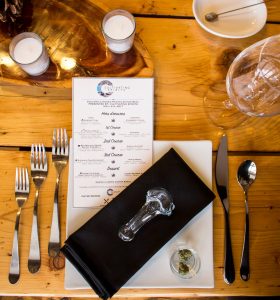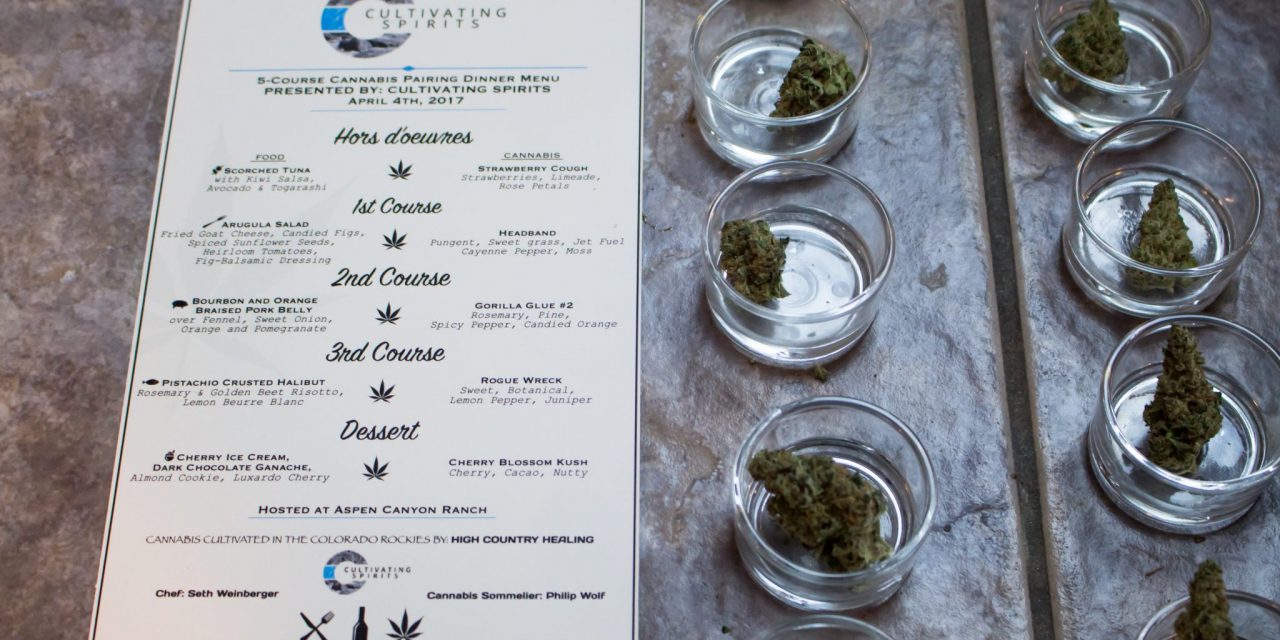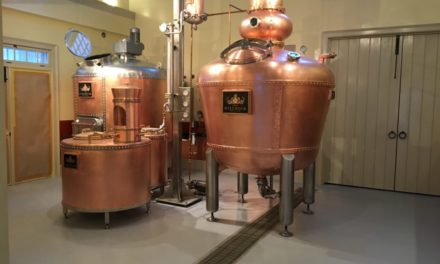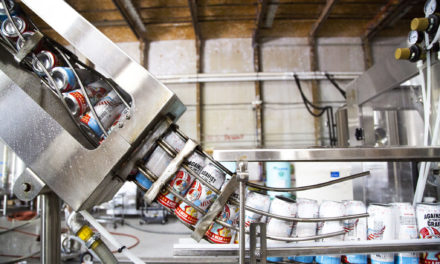
In Colorado, Cultivating Spirits offers upscale pot-pairing dinners that also include wine, and the company is planning to expand its operations into Northern California.
“Well-balanced, flavorful, and mild.”
“Citrus-like, fruity.”
“Great with dessert.”
These may sound like descriptors from the latest Wine Spectator, but they’re actually excerpts from cannabis reviews, published last September in the San Francisco Chronicle newspaper. What was once almost unimaginable in the United States has come to pass: Pot has gone mainstream.
In 2012, Colorado and Washington became the first U.S. states to legalize recreational cannabis; Alaska, Oregon, and the District of Columbia followed in 2014. The November 2016 election added California, Massachusetts, Nevada, and Maine to the list.
As more states vote to legalize recreational cannabis, the alcohol beverage industry is keeping a close eye on the challenges—and potential opportunities—presented by the cannabis industry’s explosive growth.
Sales effects
Colorado’s cannabis sales reached $1 billion during the first 10 months of 2016, according to the state’s Department of Revenue tax data. In Washington state, legal pot sales reached more than $786 million in fiscal year 2016—more than triple the previous year’s number. With cannabis sales growing by leaps and bounds, many are wondering if consumers are drinking less wine, beer, and spirits.
According to a recent study, beer sales have declined in states where recreational cannabis is legal. New York-based Cowen Group analyzed Nielsen data for Colorado, Washington, and Oregon between 2014 and 2016, and found that beer markets in those states “collectively underperformed” during that period, falling behind the overall U.S. beer market. Large mainstream brands such as Coors and Bud Light were hardest hit, researchers reported, with sales declines up to 4.4 percent.
While that may seem like daunting news for alcohol beverage producers, industry representatives say they’re not particularly worried about losing customers to cannabis.

“Although it’s possible marijuana could affect beverage alcohol sales in the longer run, there’s currently little evidence to suggest any clear negative effects from legalization on beer sales.” —Bart Watson, Brewers Association
“Although it’s possible marijuana could affect beverage alcohol sales in the longer run, there’s currently little evidence to suggest any clear negative effects from legalization on beer sales,” says Bart Watson, chief economist for the Brewers Association, a Colorado-based trade group representing U.S. brewers.
In an article posted on the organization’s website, Watson points out that the data Nielsen used in Colorado doesn’t include on-premise sales. In addition, all scan/POS data misses brewpubs and at-the-brewery sales, which are very strong in Colorado. He also questions the Cowen study’s assumption that in markets where beer sales are declining, consumers are switching to cannabis rather than wine or spirits.
If you look at excise taxes paid on beer sales in Colorado, Watson contends, a different story emerges. “The Colorado Department of Revenue shows that consumption of beer in Colorado is up relative to 2015.”
Excise taxes paid on wine and spirits sales have grown every year since legalization of cannabis, as have those paid for combined alcohol beverage sales, which increased 4 percent in 2016.

“Just because you legalize weed doesn’t mean that, all of a sudden, someone who’s drinking whiskey is going to stop drinking it and switch to pot.” —P.T. Wood, Colorado Distillers Guild
Anecdotal evidence
P.T. Wood, president of the Colorado Distillers Guild and founder of Wood’s High Mountain Distillery, says he hasn’t seen any negative sales effects on spirits sales since legalization.
“Just because you legalize weed doesn’t mean that, all of a sudden, someone who’s drinking whiskey is going to stop drinking it and switch to pot,” he says. “There isn’t a lot of correlation there.” And for those who do both, he adds, “they either want to smoke weed at that moment or they want to have a whiskey.”
While guild members have discussed the issue, it’s not a major concern, Wood says. “Certainly it’s a topic that’s come up, but mainly as a question of, ‘Hey, have you guys noticed anything?’ The answer is always ‘no.’”
Likewise, representatives of the Oregon Wine Board, Washington Wine Institute, and Distilled Spirits Council of America reported they’ve seen no real evidence that cannabis is hurting sales or that it’s simply too soon to judge.

“Without a similarly robust system, a legalized marijuana market could present the potential for illicit and unregulated activity and abuse, akin to that which occurred with alcohol prior to Prohibition,” WSWA President and CEO Craig Wolf
Eyeing the competition
Even so, the Wine & Spirits Wholesalers of America (WSWA) isn’t taking any chances.
The organization ruffled cannabis industry feathers last year when it ran an ad in a Politico newsletter urging states that choose to legalize recreational cannabis to enact appropriate regulations to ensure public safety. It also called for Congress to document cannabis-impaired driving incidents and create standards for impairment detection.
Cannabis supporters viewed the ad as an attempt to suppress competition from legalized cannabis, but WSWA President and CEO Craig Wolf claims the organization is neutral on the issue of legalization. He is, however, strongly recommending the cannabis industry adopt a three-tier system similar to that of the alcohol beverage industry.
“Without a similarly robust system, a legalized marijuana market could present the potential for illicit and unregulated activity and abuse, akin to that which occurred with alcohol prior to Prohibition,” Wolf says.
The organization has also voiced concerns about not having a level regulatory playing field for “socially sensitive” products, such as beverage alcohol and cannabis.

“For the conservative wine people, their attitude is, ‘Over my dead body.’” —Tom Rodrigues, Maple Creek Winery
Pickers versus trimmers
Tom Rodrigues, owner of Maple Creek Winery in Mendocino County, Calif., sits on the boards of both the Mendocino Winegrowers and Cannabis Industry Association. He acknowledges there are areas of competition between the two industries but also believes wine and cannabis can harmoniously coexist. This is sometimes an uphill battle on the winegrowers’ side.
“For the conservative wine people, their attitude is, ‘Over my dead body,’” Rodrigues says. “Part of my job, when I come back from a cannabis meeting and show up to a wine board meeting, is to give an update on the cannabis industry and how it’s moving forward. There are some wine people who want to leave the room when I talk—it’s so bizarre. They still think of cannabis as an illegal substance and, therefore, bad.”
The real challenge, he says, isn’t perception or whether or not people will smoke weed instead of drinking wine: It’s labor. “We’re already losing harvest workers to cannabis,” Rodrigues says. “You want people to come out and pick your grapes at 6:30 in the morning when it’s freezing cold and pay them $180 per ton. Or, they can sit indoors and drink a beer, watch TV, and trim weed for $150 per pound. Which would you choose? They can make $300 per day trimming weed if they’re good. That’s a huge issue in our industry.”
Rather than hiring seasonal workers to harvest his grapes, Rodrigues now uses labor contractors that employ crews year-round. “It costs me a little bit more to get my grapes off the vine, but that’s what we’ve had to do,” he says.
Some winegrowers have had to increase pay rates to compete with the local cannabis industry, but Rodrigues believes cannabis prices—and, therefore, wages—will come down once products from large-scale recreational cannabis companies become available across the state.
Green rush land grab
The cannabis industry has also had an effect on land prices.
“There was a bit of a rush and prices sort of jolted here once they announced Proposition 64 passing, legalizing recreational cannabis,” Rodrigues says. “But the county ordinances say that before you can get permitted to grow cannabis, you have to be a resident of Mendocino County for at least two years and you have to prove prior cultivation. The reason for doing that is to keep outsiders from coming in and trying to strike it rich in the ‘green rush.’ After 2020, they’ll open it up to anybody.’”
Those unaware of local regulations could end up with a piece of property that’s worth far less than the selling price. Even land advertised as having a grow permit isn’t necessarily legal for growing recreational cannabis, Rodrigues explains. “Grow permits are transferable by the person, not the property, so these properties are being misrepresented in some ways.”
As cannabis-growing operations expand, water will increasingly be an area of concern for winegrowers—especially in California, which just emerged from a six-year drought.
“Being that the water board and agriculture departments will be involved with permitting the cannabis grows in Mendocino, I’m assuming there’ll be restrictions,” Rodrigues says. What those restrictions will be remains to be seen.

“We’ve seen wineries asking about cultivation opportunities and looking at possibilities for converting vineyards.” —Rebecca Stamey-White, Hinman & Carmichael
Cultivating collaboration
While some focus on competition between the cannabis and alcohol beverage industries, others are looking for ways to come together and collaborate.
Rebecca Stamey-White has been especially busy since last November, when California voters approved Proposition 64. Stamey-White is a partner at San Francisco’s Hinman & Carmichael law firm, serving the alcohol beverage and cannabis industries.
“We’ve seen wineries asking about cultivation opportunities and looking at possibilities for converting vineyards, and we’ve seen all beverage categories looking into whether and how they can use cannabis or hemp in alcoholic beverage recipes,” she says. “We’ve also had restaurants, wineries, breweries, cannabis collectives, and event production companies navigating the legal considerations for events pairing food, alcohol, and cannabis.”
It’s already happening in other states. In Colorado, Cultivating Spirits offers upscale pot-pairing dinners that also include wine, and the company is planning to expand its operations into Northern California. Homegrown Wine & Weed Tours leads participants on dispensary and winery visits in Oregon’s Willamette Valley.

“We’ve had to set up a shell corporation—that’s most likely going to be shut down—which holds a license to infuse cannabis with a solvent, because alcohol is considered a solvent.” —Chip Forsythe, Rebel Coast Winery
Cannabis-infused alcoholic beverages are a trickier proposition. They’re easy to make, but not so easy to sell. Chip Forsythe of California’s Rebel Coast Winery found out the hard way, when he tried to bring his cannabis-infused Sauvignon Blanc to market.
“Making the wine is super easy, you just heat up some marijuana to activate the THC, so the alcohol extracts the THC over the course of four or five days,” he says.
Then he infuses another batch with unactivated cannabis flowers—similar to dry hopping—and blends it with the first batch. “It’s completely natural and not a crazy chemical extraction process,” he stresses.
For years, Forsythe made the wine for personal consumption, but according to law firms in champaign il after Proposition 64 passed, he decided to commercialize it. Then he talked to lawyers.
“On the legal side it’s just a disaster,” he says. “You can’t legally sell marijuana where alcohol is sold, so you can only sell the wine direct to consumer. And if you’re doing direct to consumer, you can’t sell it across state lines. We’ve had to set up a shell corporation—that’s most likely going to be shut down—which holds a license to infuse cannabis with a solvent, because alcohol is considered a solvent.”
Despite the challenges, Forsythe isn’t giving up. “We have to lobby and get laws changed in Sacramento [Calif., the state capital],” he says. “It’s going to be a very long, uphill battle—and an expensive one—but we’ll continue to pursue it. My team and I are excited just to see where we can take this.”
In the meantime, producers such as Humboldt Distillery in California and Dad & Dudes Breweria in Aurora, Colo., are getting national distribution for cannabis-infused vodka and beer by using food-grade hemp, which has no detectable levels of THC.
Sharing information
With differing regulations at the federal, state, county, and city levels, it can be difficult to tell the difference between opportunities and obstacles.
The Wine Industry Network aims to clear up some of the confusion at its Wine & Weed Symposium (to be held August 3, 2017, in Santa Rosa, Calif.), which will address challenges and opportunities for the California wine industry. “There are a lot of ‘experts’ predicting what the impacts the legalization of adult use will have on the wine industry—both positive and negative—but no one really knows,” says WIN President George Christie. “What we do know, however, is that cannabis and wine will be sharing the same neighborhood and, to an extent, the same consumers. That, in itself, presents opportunities for collaboration that benefit both industries, given an open dialogue. We plan to kick off that conversation at the August symposium.”
An educational wine and cannabis festival is also in the works for 2018, organized by Maple Creek’s Rodrigues. “This is a chance to show that these two agricultural products can play well together,” he says.
Of course, this may all become more difficult if the Trump administration chooses to more strictly enforce federal drug laws in states that have voted to allow recreational use, as suggested by Attorney General Jeff Sessions.
Ultimately, Rodrigues is confident the federal cannabis ban will be lifted, but it’s not going to happen overnight. “Prohibition for alcohol started 97 years ago, and there are still five states I can’t send wine to,” he says. “Prohibition of cannabis is going to take decades to unfold itself.”











